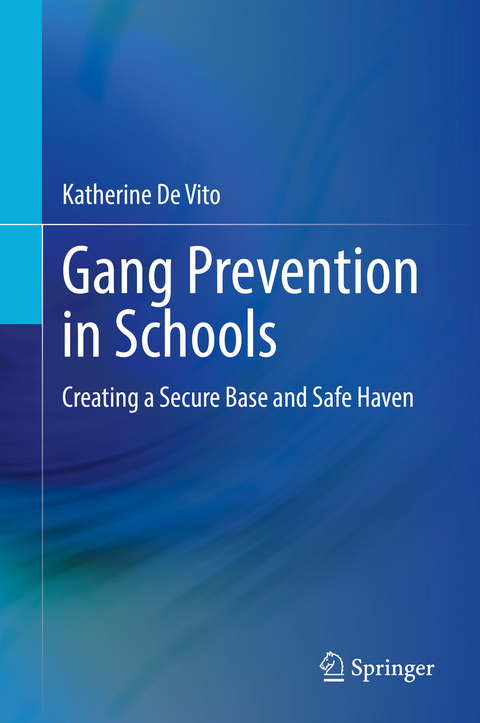
Gang Prevention in Schools
Springer International Publishing (Verlag)
978-3-030-82913-1 (ISBN)
This book delves deep into the hidden population of former gang members who share their positive and negative experiences of being gang members. Their stories of violence, hopelessness, despair, and loneliness also offer a seed of hope - they contain the building blocks for prevention. By understanding why they each turned to gangs, how they turned to gangs, and what went wrong for some along their pathways during childhood, as well as how and why they chose to leave the gang lifestyle, we can begin to put the pieces together and understand tools for gang prevention.
Schools are in the unique position to become an oasis or a safe haven for a child in a world that does not otherwise feel safe to them. School staff members can step in and become consistent people in a child's life. They can help to identify at-risk youth and intervene, facilitating a change in path away from gang membership. This book discusses how schools and staff can be instrumental in gang prevention and outlines warning signs and risk and protective factors for gang involvement. It also talks about components of gang prevention programs in schools. Additional topics explored include:- Theories of Gang Involvement
- Lack of Family Consistency: Relating Attachment Theory with Gang Involvement
- "Brotherhood, Sisterhood, Unity:" Gangs as Replacement Family
- "No Other Option:" The Role of Social Environment
- "Death, Jail, or a Turnaround:" Making the Decision to Disengage
- A Piece About Trauma-Informed Practice
Authored by a school social worker who has an insider's perspective on working in a school, Gang Prevention in Schools is a useful resource that gives a humanistic view of former gang members. The book will engage readers in the fields of psychology, social work, education and educational administration, and criminal justice, as well as have potential appeal to a lay audience due to the richness of the stories and interviews.
lt;p>Katherine De Vito, DSW, LCSW is a Licensed Clinical Social Worker (LCSW) working as a school social worker providing mental health counseling to students, crisis intervention, conflict mediation, and case management to special education students, as well as collaborating with families, teachers, administration, law enforcement, and community organizations. She also works in private practice. Prior to becoming a school social worker, Dr. De Vito worked in the nonprofit sector providing individual and group counseling both in schools and in an agency setting with adults, children, and their families. She received her Doctorate in Social Work (DSW) from Rutgers University School of Social Work in New Jersey. In her time there, she published two articles: De Vito, K. (2017). Schools fall short: Lack of continuum of care in public schools. Reflections: Narratives of Professional Helping, 23(4), 4-19; and De Vito, K. (2020) Seeking a secure base: Gangs as attachment figures. Qualitative Social Work, 19(4), 754-769. Dr. De Vito also earned a Master of Science in Social Work (MSSW) degree from Columbia University School of Social Work in New York City as well as a Bachelor of Arts degree from Rutgers College and the School of Communication, Information, and Library Studies, with a dual major in Psychology and Journalism/Mass Media. She has interned at various magazines and newspapers where she published numerous articles. Dr. De Vito also worked on the editorial staff in the children's department of several book publishing houses. She loves being able to touch the lives of her students and clients in a positive way every day. Gang prevention is a passion for her. Helping to make a difference in the lives of students and clients is both an honor and a privilege. When she is not working, she enjoys spending time with her friends and family, especially her parents, husband, and two children, Dylan and Emma.
Chapter 1: Introduction.- Chapter 2: Theories of Gang Involvement.- Chapter 3: Lack of Family Consistency: Relating Attachment Theory with Gang Involvement.- Chapter 4: "Brotherhood, Sisterhood, Unity:" Gangs as Replacement Family.- Chapter 5: "No Other Option": The Role of Social Environment.- Chapter 6: "Death, Jail, or a Turnaround:" Making the Decision to Disengage.- Chapter 7: Case Illustrations.- Chapter 8: Risk Factors and Protective Factors.- Chapter 9: Warning Signs of Gang Involvement.- Chapter 10: Building a Safe Haven.- Chapter 11: A Piece About Trauma-Informed Practice.- Chapter 12: School Prevention Programs.- Chapter 13: Being the Change: Making a Difference.
| Erscheinungsdatum | 02.11.2021 |
|---|---|
| Zusatzinfo | XVII, 196 p. 36 illus., 33 illus. in color. |
| Verlagsort | Cham |
| Sprache | englisch |
| Maße | 155 x 235 mm |
| Gewicht | 481 g |
| Themenwelt | Sozialwissenschaften ► Pädagogik ► Sozialpädagogik |
| Schlagworte | Attachment Theory • Gang prevention in schools • gangs as brotherhood • gangs as consistency • gangs as family • gangs as sisterhood • gangs as unity • interviews with former gang members • risk factors for gang involvement • schools as components of gang prevention programs • theories of gang involvement • warning signs of gang involvement • youth violence |
| ISBN-10 | 3-030-82913-8 / 3030829138 |
| ISBN-13 | 978-3-030-82913-1 / 9783030829131 |
| Zustand | Neuware |
| Haben Sie eine Frage zum Produkt? |
aus dem Bereich


